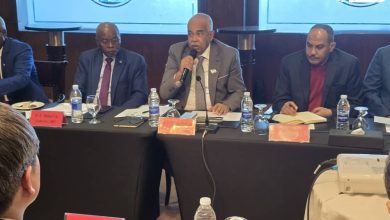Sudan ‘s Gold between Smuggling and Exporting

Report by Nahid Oshi
Gold is considered one of the huge resources that the Sudanese economy depends on to promote its exports. According to the Central Bank of Sudan in its annual report for the year 2022, gold is on top of the country’s non-petroleum export, constituting 46.3% of Sudan’s total foreign exports, with a monetary value equal to 2.02 billion dollars out of a total of 4.357 billion dollars which was the country’s total exports for the past year.
This was a bright image of gold exports until the year 2022, but the events of April 2023 and the outbreak of war distorted that image and turned the scales upside down, where the Secretary-General of Gold Exporters Division, Abdul Mawla Hamid Al-Qaddal, revealed that gold exports were impacted by the repercussions of the war in Sudan. He said in a statement to (Sudan Events): Export operations stopped since the beginning of the war until November, when they resumed again, but production witnessed a decline due to the war conditions. He pointed out that exports from the beginning of the year until the 31st of March amounted to (7) tons, in addition to (mining residues), which is in the range of (3) tons. He warned that uncertainty and security stability threaten the exports, and said that capital needs a safe climate for work.
Private Mining:
Professor of Economics and Finance at the University of Khartoum, Prof. Ibrahim Onour, was not either optimistic about the near future of gold exports.
He said, “I do not expect there to be a change in the year 2024 or even 2025 in terms of the fact that 80% of gold production is from private mining, and the government has not had control over it for a long time, and therefore 80% of gold production escapes outside Sudan, given that most private mining areas are far away from the center and the presence of the authorities.
Gold smuggling:
Onour said that estimates in 2021 revealed the smuggling of more than 200 tons, while the official gold harvest does not exceed 30 tons per year, and a large percentage of gold is produced through private mining, particularly in the northern state and the Red Sea, South Kordofan, Darfur, and Blue Nile states.
Pointing out that production was not affected by the war, but the proceeds for the official channels will be less due to the war and the lack of security in the states of Darfur and many locations in the northern state, South Kordofan, and Blue Nile, all of which contribute to an increase in the proceeds of smuggling, so production as a whole was not affected, but the share of the government sector decreases.
The media secretary of the Gold Division, director of a company for manufacturing, recycling and exporting gold, Atif Ahmed Abdel Qader, revealed the size of the losses incurred by the gold sector as a result of the war that broke out in Sudan. He told (Sudan Events) that until now he has not quantified the size of the losses from the refinery, the gold looted from the markets, and what the merchants were exposed to. These are huge losses that cannot be accurately estimated until after the war stops, but they exceed one hundred million dollars.
He noted the significant impact on the sector, as the Sudan Refinery was robbed, the Gold Center (the Gold Building) was looted, and the shops and offices were destroyed. This is a major loss that affected the private sector and anyone working in the field of gold trade and businessmen were greatly affected. He described the encroachment, looting and theft of the shops as (Barbarism) and targeting the sector.
Atif stressed that gold exports can be relied upon by the state in the next stage due to the war conditions, and it is the closest way to providing foreign exchange, and there are lucrative returns at the present time, and the banks are active with the Bank of Sudan in the lucrative price of the proceeds, and there is an active movement, and we expect in the coming days that the export will be in a larger quantity.



